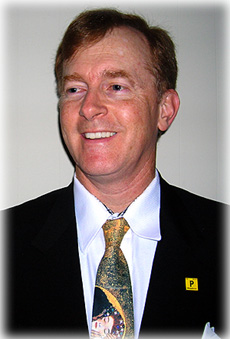 by Preston MacDougall November 15, 2008
In notches of both the Rust and Bible Belts there were responses that echoed a troubled past. But elsewhere in the country, as well as abroad - from symphony goers at Roy Thomson Hall in Toronto, to online bloggers down under in Sydney - the most resounding response was that of redemption. He has indeed brought profound change to the highest office in the land. But, ironically, Barack Obama must now rely on the trickle down theory in order for his presidency to be successful. Congress must change the way it operates. Federal departments must change the way they enforce national policies. States must be free to change in their own ways. Locally, we must change the way we educate our future workforce, especially in the areas of math and science. If we do all of this, and more, then perhaps we will indeed be "the change that we have been waiting for." Change happens. This is basically guaranteed by the Second Law of Thermodynamics - a topic that is mentioned in many science, engineering, and even philosophy classes, and can even be spotted on the pages of some coffee table books with intimidating titles, like "A Brief History of Time". Most students will have their most in depth encounter with this topic in a course called Physical Chemistry - or p-chem to make it sound more friendly. That is, unless they can find a way to avoid it. In addition to learning the how, and much of the why, of change at the molecular level, not to mention neat experimental techniques that chemists use to probe molecular structures, they may get to put a coveted bumper sticker on their car - Honk if you passed p-chem! But the real joy of mastering p-chem is the sense of optimism that should accompany an understanding of the Second Law of Thermodynamics. Yes, change is inevitable, and for the entire universe it tends towards disorder. But, for carefully designed systems, which interact with their environment in smart ways, we can achieve the change that we desire. Consider an ice cube. In the freezer, it is in the lowest energy state for water - a solid. (There are actually numerous solid structures of water, and probably more to be found, but the joys of p-chem are best appreciated incrementally, so we'll continue.) If you move the ice cube to an ambient environment, such as a coffee table, it will do something remarkable - it will melt! If this doesn't seem remarkable to you, consider how much you paid to fill-up your gas tank, then consider that the ice cube is taking the same kind of energy - enthalpy - and half-filling its molecular tank for free! (In steam engines these "tanks" are more completely filled, and not for free. Again, that's another quantum of p-chem joy that we'll save for another day.) Plant cells do a similar thing, with much sweeter results, when they harness both solar energy and heat from the environment, in addition to carbon dioxide and water molecules, to make sugars and starches from scratch. Sugars are high-energy molecules, and can release their stored energy either in a controlled chemical digestion process, or in a catastrophic explosion. The Second Law is never violated, so change will happen. Murphy's Law, however, is not backed-up by science, and neither is it found in the indices of p-chem textbooks. We can avoid catastrophic change by enacting smart policies. One set of smart policies was developed in 2005 by a committee of esteemed members of our National Academies of Engineering and the Sciences, and the Institute of Medicine. Their report was titled "Rising Above the Gathering Storm: Energizing and Employing America for a Brighter Economic Future". If, as a country, we don't rise above the gathering storm, John McCain will have been prophetic in a metaphorical sense different from what he intended. We will all be Joe the Plumbers - trying to cope with a coast-to-coast flood of red ink.
On the Web:
E-mail your letters & opinions to editor@sitnews.us SitNews ©2008 Stories In The News Ketchikan, Alaska |
||
